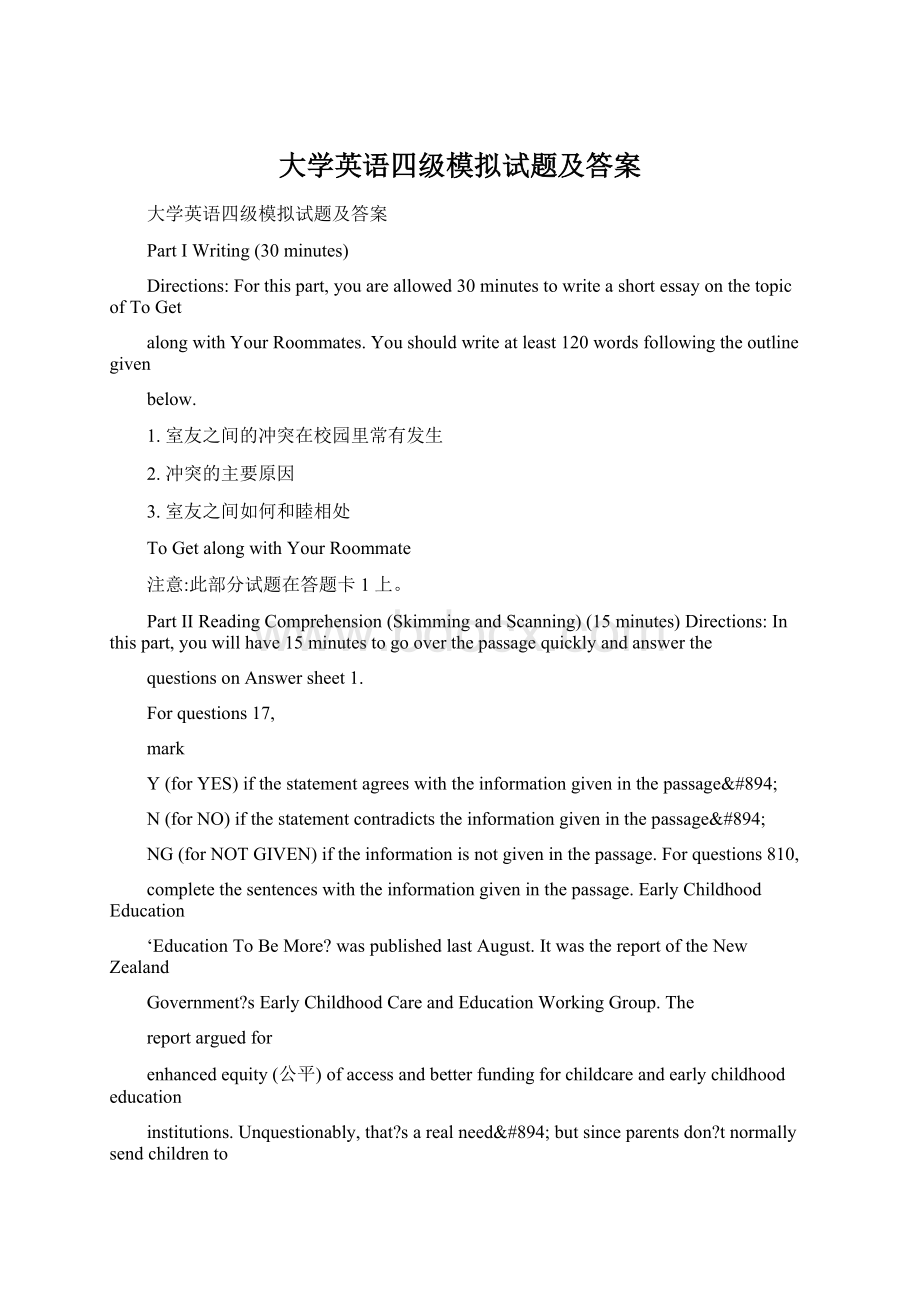大学英语四级模拟试题及答案.docx
《大学英语四级模拟试题及答案.docx》由会员分享,可在线阅读,更多相关《大学英语四级模拟试题及答案.docx(31页珍藏版)》请在冰豆网上搜索。

大学英语四级模拟试题及答案
大学英语四级模拟试题及答案
PartIWriting(30minutes)
Directions:
Forthispart,youareallowed30minutestowriteashortessayonthetopicofToGet
alongwithYourRoommates.Youshouldwriteatleast120wordsfollowingtheoutlinegiven
below.
1.室友之间的冲突在校园里常有发生
2.冲突的主要原因
3.室友之间如何和睦相处
ToGetalongwithYourRoommate
注意:
此部分试题在答题卡1上。
PartIIReadingComprehension(SkimmingandScanning)(15minutes)Directions:
Inthispart,youwillhave15minutestogooverthepassagequicklyandanswerthe
questionsonAnswersheet1.
Forquestions17,
mark
Y(forYES)ifthestatementagreeswiththeinformationgiveninthepassage;
N(forNO)ifthestatementcontradictstheinformationgiveninthepassage;
NG(forNOTGIVEN)iftheinformationisnotgiveninthepassage.Forquestions810,
completethesentenceswiththeinformationgiveninthepassage.EarlyChildhoodEducation
‘EducationToBeMore?
waspublishedlastAugust.ItwasthereportoftheNewZealand
Government?
sEarlyChildhoodCareandEducationWorkingGroup.The
reportarguedfor
enhancedequity(公平)ofaccessandbetterfundingforchildcareandearlychildhoodeducation
institutions.Unquestionably,that?
sarealneed;butsinceparentsdon?
tnormallysendchildrento
preschools
untiltheageofthree,arewemissingoutonthemostimportantyearsofall?
A13year
studyofearlychildhooddevelopmentatHarvardUniversityhasshownthat,bythe
ageofthree,mostchildrenhavethepotentialtounderstandabout1000words–mostofthe
languagetheywilluseinordinaryconversationfortherestoftheirlives.Furthermore,researchhasshownthatwhileeverychildisbornwithanaturalcuriosity,itcan
besuppresseddramaticallyduringthesecondandthirdyearsoflife.Researchersclaimthatthe
humanpersonalityisformedduringthefirsttwoyearsoflife,andduringthefirstthreeyears
childrenlearnthebasicskillstheywilluseinalltheirlaterlearningbothathomeandatschool.
Onceovertheageofthree,childrencontinuetoexpandonexisting
knowledgeoftheworld.
Itisgenerallyacknowledgedthatyoungpeoplefrompoorersocioeconomic
backgrounds
tendtodolesswellinoureducationsystem.That?
sobservednotjustinNewZealand,butalsoin
Australia,BritainandAmerica.Inanattempttoovercomethateducationalunderachievement,
a
nationwideprogramcalled„Headstart?
waslaunchedintheUnitedStatesin1965.Alotofmoney
waspouredintoit.Ittookchildrenintopreschool
institutionsattheageofthreeandwas
supposedtohelpthechildrenofpoorerfamiliessucceedinschool.Despitesubstantialfunding,resultshavebeendisappointing.Itisthoughtthattherearetwo
explanationsforthis.First,theprogrambegantoolate.Manychildrenwhoentereditattheageof
threewerealreadybehindtheirpeersinlanguageandmeasurableintelligence.Second,theparents
werenotinvolved.Attheendofeachday,„Headstart?
childrenreturnedtothesamedisadvantaged
homeenvironment.
Asaresultofthegrowingresearchevidenceoftheimportanceofthefirstthreeyearsofa
child?
slifeandthedisappointingresultsfrom„Headstart?
apilotprogramwaslaunchedin
MissouriintheUSthatfocusedonparentsasthechild?
sfirstteachers.The„Missouri?
program
waspredicatedonresearchshowingthatworkingwiththefamily,ratherthanbypassingthe
parents,isthemosteffectivewayofhelpingchildrengetofftothebestpossiblestartinlife.The
fouryear
pilotstudyincluded380familieswhowereabouttohavetheirfirstchildandwho
representedacrosssection
ofsocioeconomic
status,ageandfamilyconfigurations(结构).They
includedsingleparent
andtwoparent
families,familiesinwhichbothparentsworked,and
familieswitheitherthemotherorfatherathome.
Theprograminvolvedtrainedparenteducatorsvisitingtheparents?
homeandworkingwith
theparent,orparents,andthechild.Informationonchilddevelopment,andguidanceonthingsto
lookforandexpectasthechildgrowswereprovided,plusguidanceinfosteringthechild?
s
intellectual,language,socialandmotorskill
development.Periodiccheckups
ofthechild?
s
educationalandsensorydevelopment(hearingandvision)weremadetodetectpossiblehandicaps
thatinterferewithgrowthanddevelopment.Medicalproblemswerereferredtoprofessionals.
Parenteducators
madepersonalvisitstohomesandmonthlygroupmeetingswereheldwith
othernewparentstoshareexperienceanddiscusstopicsofinterest.Parentresourcecenters,
locatedinschoolbuildings,offeredlearningmaterialsforfamiliesandfacilitiesforchild.
Attheageofthree,thechildrenwhohadbeeninvolvedinthe„Missouri?
programwere
evaluatedalongsideacrosssection
ofchildrenselectedfromthesamerangeofsocioeconomicbackgroundsandfamilysituations,andalsoarandomsampleofchildrenthatage.Theresults
werephenomenal.Bytheageofthree,thechildrenintheprogramweresignificantlymore
advancedinlanguagedevelopmentthantheirpeers,hadmadegreater
stridesinproblemsolving
andotherintellectualskills,andwerefurtheralonginsocialdevelopment.Infact,theaverage
childontheprogramwasperformingatthelevelofthetop15to20percentoftheirpeersinsuch
thingsasauditorycomprehension,verbalabilityandlanguageability.Mostimportantofall,thetraditionalmeasuresof„risk?
suchasparents?
ageandeducation,or
whethertheywereasingleparent,borelittleornorelationshiptothemeasuresofachievement
andlanguagedevelopment.Childrenintheprogramperformedequallywellregardlessof
socioeconomic
disadvantages.Childabusewasvirtuallyeliminated.Theonefactorthatwas
foundtoaffectthechild?
sdevelopmentwasfamilystressleadingtoapoorqualityofparentchild
interaction.Thatinteractionwasnotnecessarilybadinpoorerfamilies.
Theseresearchfindingsareexciting.ThereisgrowingevidenceinNewZealandthatchildren
frompoorersocioeconomic
backgroundsarearrivingatschoollesswelldevelopedandthatourschoolsystemtendstoperpetuate(使永存)thatdisadvantage.The
initiativeoutlinedabovecould
breakthatcycleofdisadvantage.Theconceptofworkingwithparentsintheirhomes,orattheir
placeofwork,contrastsquitemarkedlywiththereportoftheEarlyChildhoodCareandEducation
WorkingGroup.Theirfocusisongettingchildrenandmothersaccesstochildcareand
institutionalizedearlychildhoodeducation.Educationfromtheageofthreetofiveisundoubtedly
vital,butwithoutasimilarfocusonparenteducationandonthevitalimportanceofthefirstthree
years,someevidenceindicatesthatitwillnotbeenoughtoovercomeeducationalinequity.
1.Theskillslearnedbychildrenatageofthreewillbeusedinalltheirlaterlearninginlife.
2.The„Headstart?
programfinallysucceededinitsaim.
3.The„Missour?
programsuppliedmanyformsofsupportandtrainingto
parents.
4.Most„Missouri?
programthreeyearolds
scoredhighlyinareassuchaslistening,speaking,
reasoningandinteractingwithothers.
5.„Missouri?
programchildrenofyoung,uneducated,singleparentsscoredlesshighlyonthe
tests.
6.Thericherfamiliesinthe„Missouri?
programhadhigherstresslevels.
7.Educationalinequitycannotbeovercomeforchildrenfromdifferentfamilybackgrounds.
8.Theaimof„Headstart?
programistohelpchildrenfrompoorfamiliesovercome
____________________.
9.Themosteffectivewayofhelpingchildrengetofftothebestpossible
startinlifeis
____________________.
10.Theconceptofworkingwithparentsintheirhomescontrastsquitemarkedlywiththereport
oftheEarlyChildhoodCoreand____________________.
PartIIIListeningComprehension(35minutes)
SectionA
Directions:
Inthissection,youwillhear8shortconversationsand2longconversations.Atthe
endofeachconversation,oneormorequestionswillbeaskedaboutwhatwassaid.Boththe
conversationandthequestionswillbespokenonlyonce.Aftereachsectiontherewillbea
pause.Duringthepause,youmustreadthefourchoicesmarkedA),B),C)andD),anddecide
whichisthebestanswer.ThenmarkthecorrespondingletteronAnswerSheet2withasingle
linethroughthecentre.
11.A)ToordersomemedicineforAuntMargaret.B)Togetsomeexercise.
C)Tobuysomeitems.
D)Toseetheiraunt.
12.A)Anyonecandoit.
B)Noonecandoit.
C)Alexcanprobablydoit.
D)Alexprobablyshouldn?
tdoit.
13.A)Teaisbetterthancoffee.
B)Themanshouldswitchtotea.
C)Therearetworeasonsnottodrinkcoffee.D)Themanshouldn?
tdrinkeither.
14.A)Atahairdresser?
s.B)Atatailor?
s.
C)Atabutcher?
s.D)Ataphotographer?
s.
15.A)Angry.B)Tired.C)Hungry.D)Disappointed.16.A)Shewouldlikesomesoup.
B)She?
sinvitingthemantolunch.
C)Shewantstoknowifthemanlikeschicken.
D)Sheatelunchearlier.
17.A)Veryfewpeoplecometoit.
B)Agoodnamehasn?
tbeenfoundforit.
C)Peopledon?
tlikeclimbingthestairstogetthere.
D)Shehasdecidedtophonetheticketoffice.18.A)Itwasdesignedbymodernartists.B)Itwillcolorblackandwhiteprints.C)Itsmerchandisemustbecarefullysortedthrough.D)Itsbestselectionisofmodernartprints.Questions19to22arebasedontheconversationyouhavejustheard.
19.A)Aclasspresentationthey?
repreparing.
B)Atelevisionprogramthemaniswatching.C)Visitingaclosefiendoftheirs.
D)Studyingforatest.
20.A)He?
stakingabreakfromstudying.
B)Hehasalreadyfinisheds